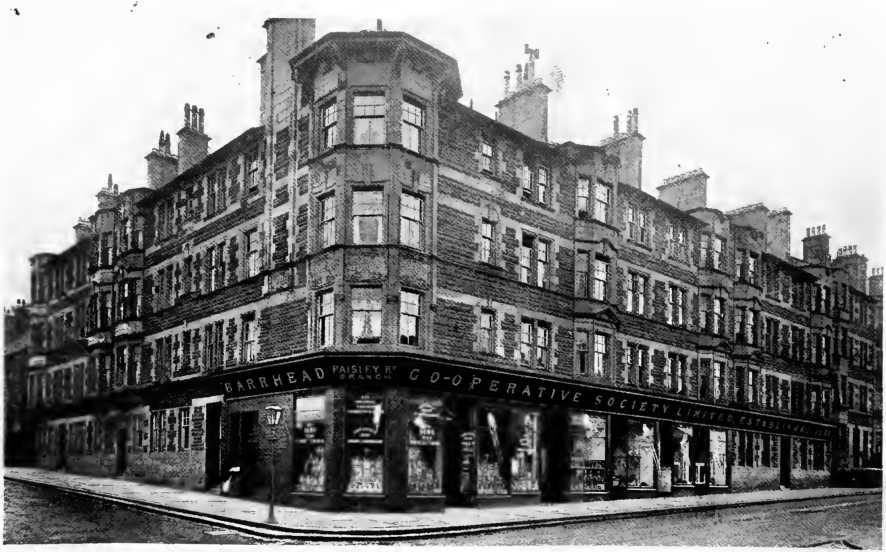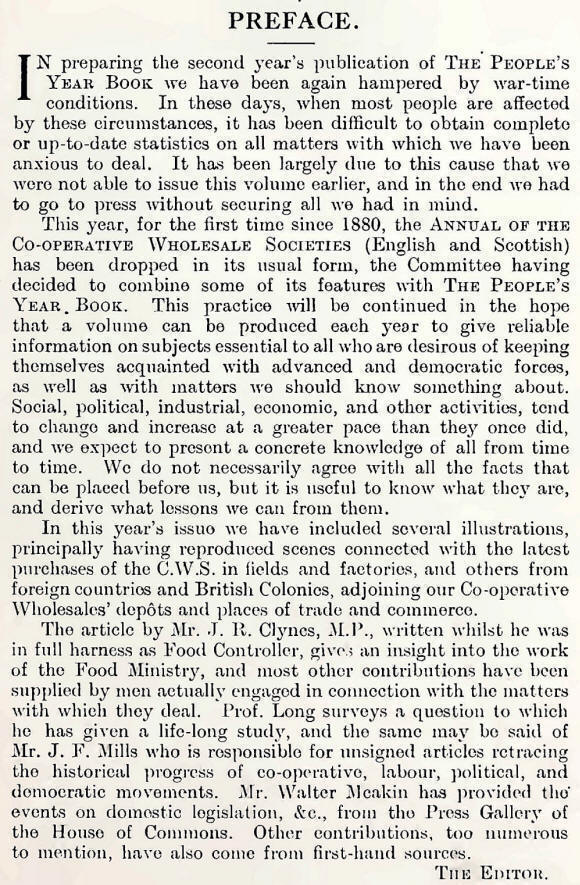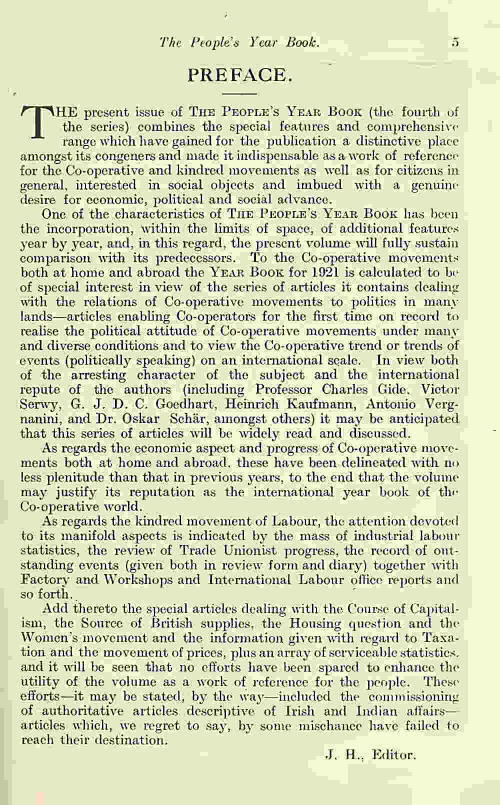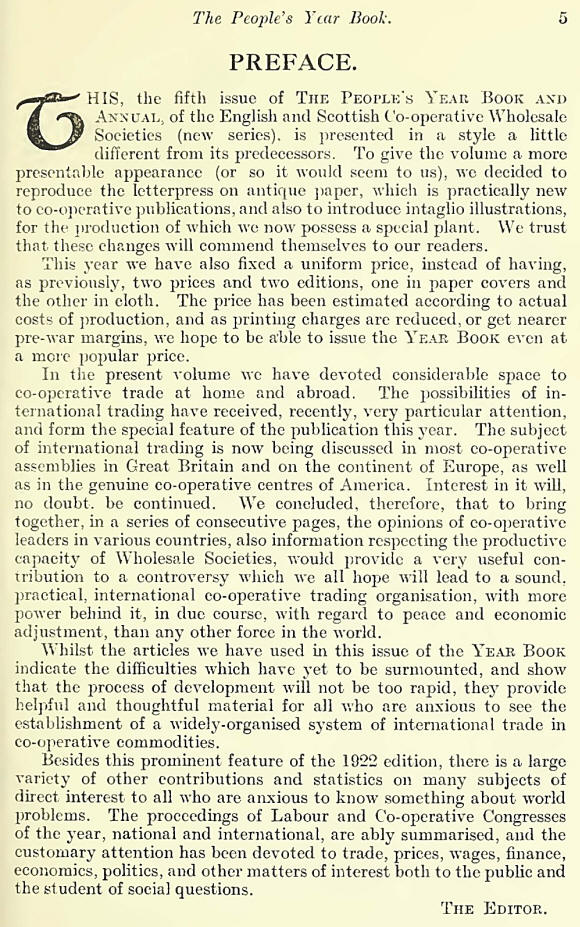|

PREFACE
THE writing of a preface
provides an author with a convenient opportunity to do several things which
he regards as more or less important. It enables him to explain the plan he
has adopted in the pages that are to follow; to apologise for shortcomings
that he, probably more than any other, is conscious of; and to acknowledge
his indebtedness to friends who have helped him with information or with
words of encouragement and counsel. Under the first of these heads a few
words seem necessary. In preparing this' historical sketch of the formation
and development of Barrhead Co-operative Society the writer has kept
steadily in view the purely local character of his commission. There was
frequent temptation—particularly in the earlier chapters to widen the scope
of the work into a consideration of industrial history in the century
preceding the birth of Co-operation, and of the industrial conditions amid
which the new movement was born. It would have been easy, and in some
respects simpler, to have dipped into the wider Co-operative movement, and
to have shown how great was the army in which Barrhead Society was a
marching unit. But this temptation was successfully resisted, and there has
been strict attention to the local propaganda and the local men, with no
reference to the larger issues unless where such seemed essential.
An effort has been made to
present a clear and fairly definite picture of the Barrhead in which our
fathers lived, and of the social conditions under which they did their
pioneer work for Co-operation. The aim has been to record all the important
steps of the Society’s development, and regret may be expressed that the
need for keeping the book within reasonable limits has necessitated the
exclusion of material for which the writer would fain have found space. As
far as possible, every incident narrated and every fact asserted has been
verified ; and the determination to use only what was unmistakable has
caused the omission of not a few items that would have proved interesting,
but the authenticity of which appeared to be doubtful.
The task has been no light
one, for it involved a great deal of burrowing amongst old records, and it
entailed much interviewing of the yet remaining actors in the historical
pageant which was to be depicted. It meant also the gathering together of a
mass of material far beyond actual requirements, so that the most important
and most interesting portions might be selected. Against this, however, is
to be set down the fact that the work was of a congenial character, and
brought with it a pleasure of a very deep kind. In particular, there has
been a real and heartfelt satisfaction in being permitted to preserve, even
in a fragmentary way, the memories of the able and devoted band of workers
whose efforts created and sustained the young society.
Apologies sometimes savour of
the hypocritical; and, to avoid falling into this error, we will make no
excuses beyond remarking that, whatever faults the critic may point to, will
not, at anyrate, spring from carelessness or want of desire to present the
story of our Society in a reliable and interesting fashion. It will he with
the readers of the book to determine in how far the written record is worthy
of the subject.
In the matter of thanks it is
impossible to indicate all those who deserve to be named. To Mr William
Maxwell we are indebted for information and for a perusal of Mr M'Innes’s
journal, the first Scottish Co-operator. Thanks are also due to Mr Mallace,
of St Cuthbert's, Edinburgh; to Mr A. B. Weir, for assistance and advice; to
Mr James Maxton, M.A., who kindly undertook the correction of the proofs; to
Mr Thomas Dykes, to whom I am indebted for valuable assistance in the
compilation of statistics; and, last, but not least, to the members of the
Jubilee Committee, for their initial confidence in placing the task in the
writer’s hands, and for their continued encouragement and kindness during
the progress of the work.
R. M.
May 1911.
CONTENTS
Chapter I. 1860-61 .
Establishment of the Society
Chapter II. Condition of Barrhead about 1860
Chapter III. 1861-71 : Early Days of the Society
Chapter IV. 1871-81 . Rapid Progress
Chapter V. 1881-91 . Continued Advance
Chapter VI. 1891-1901 . Further Progress
Chapter VII. 1901-11 : Our Own Times
Chapter VIII. Barrhead’s Contribution to the General Movement
Chapter IX. The Pioneers of the Society
Chapter X. The Educational Department
APPENDICES.
Presidents of the Society
Secretaries of the Society
Treasurers of the Society
Barrhead Representatives on S.C.W.S. Board
Barrhead Representatives on Committee of Renfrewshire Conference Association
Admission Lines granted for various Institutions during 1910
Barrhead Representatives on the “Scottish Co-operator" Newspaper Board
Capital Account of Society at December 1910
Statistics of Progress, 1861-1911
Jubilee Celebration Arrangements
Wholesale Co-operation
in Scotland
The Fruits of Fifty Years' Efforts (1868-1918) (pdf)
ScotMid
The Edinburgh based Co-operative society
The People's Year Book
An annual of useful information prepared by the Co-Operative Press Agency
PREFACE
IT is not possible to compile a work of this
character at present without being seriously affected and handicapped by
war-time conditions. There are not the facilities there were prior to 1914
for obtaining up-to-date statistics, whilst many topical matters with which
we should like to have dealt are now characterised by such frequent and
rapid changes that they lose much of their use and value before they can be
conveyed to the public through the medium of a year book. We have had,
therefore, to omit features which would form a permanent asset to an annual
volume like the one we now place before you, and hope to develop from year
to year, especially as prices of printing materials approach a normal level.
We have always felt that a year book of helpful and essential information on
co-operative and allied subjects was needed, and in our first effort we have
to regret several omissions which war-time circumstances and regulations
have compelled us to make. We trust to remedy this defect, however, in
future. In our first year of publication we were anxious to give an
intelligent, but not too ponderous, survey of the co-operative activities of
Europe, also in countries outside the Continent, and, although we have had
to make important erasions with regard to the historical growth of the
co-operative idea at home and abroad, we present a compilation of facts and
figures on world-wide co-operation which we do not remember having been done
before so comprehensively. In view of the intercommunication between
countries being at present difficult and unreliable, and impossible in some
cases, this has entailed considerable research in foreign newspapers and
periodicals, particularly with regard to up-to-date figures. But, whilst we
have endeavoured (and hope to do more in subsequent editions) to provide
information of a general style which may be useful to speakers, writers,
members of public authorities and committees, also all seekers after facts,
we have realised how much space could be occupied with the world activities
of co-operation alone. The plan of co-operation that began at Rochdale has
now extended and been established—in direct or modified forms—in nearly all
the civilised nations of the earth, and a mere statistical annual record
(bald and fleshless) would itself make up a very weighty and cumbersome
volume.
We have, nevertheless, varied our pages with series of figures and concrete
descriptions touching social, political, economic, industrial, and domestic
affairs. Figures dealing with wages, prices, capital, production,
consumption, labour, trade unionism, and a host of other kindred matters,
including the industrial battlefield and the field of sport, are also
encompassed. We hope our compilation will meet with your approval as being
informing and as a work of reference. For next year, to enlarge its
usefulness, we shall welcome criticism and suggestions.
THE EDITOR.
1918 - First Year of
Publication
1919 - Second Year of
Publication

The National Kitchens Movement
THE establishment of national kitchens and
restaurants is one of many measures so accordant with commonsense and public
utility that the very idea of such in normal times was scouted as rankly
Utopian and as altogether incompatible with the conditions of progress in
the best of all possible worlds. In the general bouleversement of
stereotyped ideas brought about by the war, however, the Utopianism of the
pre-war period has become the practical politics for to-day, and probably
for to-morrow and the day after. When Governments have so far descended from
their Olympian altitudes as to provide us with daily bread, national tea and
sugar, and standard clothing, and concern themselves with our rations of
fuel and wants of all kinds, the circumstance may be regarded as an outward
and visible sign of a far-reaching change of conception with regard to
social affairs and to the relations of the State and to the nation at large.
For years in succession the trend of events has been to impress the nation
with the conception that the public welfare is the supreme law, and that the
State is an essential factor in the promotion of the general weal: and
whilst numerous institutions can only be justified as war-measures, others
have shown themselves of such public utility as to ensure the probability of
their permanence when peace-time comes round. National kitchens and
restaurants may be said to rank in this category.
In view of the success of the movement, due credit must be given to the late
Lord Rhondda for adopting a good idea, and for establishing the National
Kitchens Division of the Food Ministry and so setting the movement
officially going and giving it a national status. Since then we have had the
Food Ministry carrying on a public campaign on behalf of Food Kitchens,
where formerly it was members of the public who had to institute a campaign
to secure attention to the possibilities realisable by the methods of public
organisation.
The Organisation and Aims of the Movement.
To-day, local authorities are endowed with the authority and the means to
set up National Kitchens on the public behalf; but the circumgyration
required to bring all this about is indicated by the details recorded by the
Assistant Director of the National Kitchens Division:—
Lord Rhondda believed in decentralisation. He believed in giving a local
authority power to manage its own affairs. In regard to kitchens, power was
given to all local authorities to establish and maintain kitchens, and
authority was vested in them to delegate any of their powers to any
committee that they might appoint. The Local Government Board were
approached, and they also issued an Order to local authorities authorising
them to use money from the rates if necessary for the establishment and
maintenance of kitchens. Up to that point the position was perfectly clear
Then came the question of the capital cost. The Treasury were approached
several times and eventually granted two concessions. The second was very
advantageous and was transmitted to all local authorities in the country. It
was that the Ministry would advancte the total capital cost of the kitchens
as a loan free of interest, to be repaid in equal annual instalments spread
over ten years.
The policy of the Ministry was then to bring home to the local authorities
exactly what they should do. Steps were taken by letter, by circular, and b\
personal interview, to explain the details of the various Orders and the
methods by which the Ministry considered the kitchens should bo run. It was
laid down as a cardinal principal that the kitchens worn to be
self-supporting and run as a business proposition, and there was to be no
air or semblance of charity about them at all. The quality of the' food to
be. supplied was one of the most important questions to lx< tackled; others
worn to avoid the mistakes of the past, to avoid anything in the nature of
glorified soup kitchens, and to avoid the faulty methods apparent in the
German kitchens, where food is supplied in bulk, so that nothing short of
starvation has driven the German people to the kitchens. Our idea was that
everybody in this country was entitled to facilities for getting good food
in national kitchens, regardless of tho individual's means, and that was one
thing insisted noon in the training of cooks and supervisors who had to take
charge of the kitchens.
One of the ideas of the National Kitchens Committee was thal through the
medium of the kitchens, if they were properly run, people—not only the
customers, but also the numbers of small caterers throughout the country
might be brought to see that it was possible to give people appetising and
nourishing food at a price that would enable them to make a profit, and
still be reasonable to tho customers.
The National Kitchens Division
took up the standpoint that, them was no reason why the working-olasses
should not lie better fed than they were now. The Ministry felt that it
could be done, and by setting up some kitchens which worn run entirely by
the department, they had proved that it can be done on a commercial basis of
making a profit. They frequently received letters from different parts of
the country saying that there was a great demand for national kitchens in
that, particular area. If they had an official available they sent him down
to-remind the local people of the powers which they had got, and did_ all
they could to induce those people to put their powers into operation.
The Need of Public Initiative
With the necessity of public initiative, as emphasised by the Assistant
Director of the National Kitchens Division, all will agree:—
But after all, the success of the development of the national kitchens as a
business proposition depended entirely upon the public. It was strong public
opinion which enabled them to be started, and it was public opinion and
action which would enable them to be run successfully after they were
started, so that in the case of any particular trade or area where there was
a distinct need for cooked food that was not at present available, the first
step was to move the local authority. At the same time they were dealing
with the local authority, they could deal with the Ministry.
London Experiments.
The national kitchens, established as models by the Ministry of Food and by
way of experiment, have proved an unqualified success. Thus, with regard to
the Kitchen at Poplar, it was stated after the experiment had been tried for
three months that the Kitchen had been a success from the very beginning;
every week showing a balance of income over expenditure, and the last Beck a
profit (as ascertained for municipal purposes) equal to over 50 per cent, on
the capital outlay; whilst evidence of the popularity of the Kitchen is
afforded by the fact that from 1,000 portions per day served in the first
part of the period named the number increased to over 2,300 before the end
of three months. The scale of charges is indicated by the following
particulars:—
Soup, Id. per half-pint, and per pint, l½d. Cooked meat, entrees, patties,
pies, puddings, or slices from the joint, half a coupon, 4d. and Patties,
&c., 4d. each.
Two tickets for half a coupon available on different days.
Vegetables, 1d. per portion.
Fish, 3d. per portion. -
Vegetarian dishes, 3d. per portion.
Sweets, 4d. per portion.
Cup of tea and scones, 1d.
Coffee, 1d. per cup.
Scones, 1d. each.
Bread and butter, 1d. per slice.
Jam, 1d. per portion.
Pickles, 1d. per portion.
A success even greater than that of the Poplar Kitchen has been the national
restaurant established in New Bridge Street, London, by the Ministry of
Food. During the three weeks ending on August 24th, the net prolit amounted
to £50. 14s. 5d. for the first week, to £70. 13s. 9d. for the second, and to
£73. Os'. 4d. for the third: deductions being made for full rent, management
charges, reserves for renewals, interest on capital at 5J per cent, and
depreciation at 10 per cent, to arrive at net profit: " The rate of £70 per
week, which appears to be maintainable, would be equal to 70 per cent per
annum on the capital outlay, and would repay this within eighteen months.”
During the third week the number of persons served with meals reached
15,525; l\d. being the average receipt for each meal, while the cost worked
out at a trifle under 6£d. after allowance for all charges—the resultant net
profit being 1.1½d. per meal.
Conditions of Success.
From the experience gained in the Poplar enterprise, the Ministry of Food
has emphasised the following conditions as essential to success:—
The premises must be in a good position, and not in a back street, nor in a
basement which necessitates descending many steps to arrive at the kitchen.
The interior must be bright and attractive.
The plant and equipment must be modem and efficient, and not a collection of
old gas stoves.
The cooks and the rest of the staff must bo suitably attired.
The menu must be varied, and the food of the best quality, prepared by
experienced cooks who can produce the best results in the most appetising
and attractive form, regard being had at all times to nutritive values.
Granting these conditions, it is possible for local authorities to seeure
such benefits and advantages as a national profit in the saving of food and
fuel, a municipal profit whieh may be applied in affording additional
quantities of cooked food, a health profit in the provision of better food
for the people, and an individual profit in the saving of time and money to
the patron.
The Growth of the Movement.
Following on the London experiments, the plans of the Ministry of Food in
September last embraced the establishment of national model restaurants in
Birmingham, Bristol, Cardiff, Glasgow, Leeds, Manchester, Newcastle, and
Brighton. And how far the movement had grown by that period is indicated by
the official estimate of 623 kitchens and restaurants serving approximately
a million portions of food per day, and by the fact of schemes for about 150
more having been approved or being in course of preparation, London coming
at the head of a lengthy list with schemes for an additional 36, Yorkshire
next with schemas for 20, and Nottinghamshire the third with plans for 22.
All the same, circumstances clearly show that infinitely more might be done.
When one considers the huge industrial areas in which no effort has yet been
made, one realises once again the passive resistance to public enterprise
characteristic of local authorities preponderantly representative of
profiteering interests—a resistance which nothing can overcome but
uncompromising pressure on the part of the public, in which connection it is
clearly the duty of the local labour movement everywhere to give the public
a lead.
1920 - Third Year of
Publication

SIR WILLIAM MAXWELL
AS a tribute to his work for co-operation,
nationally and internationally, Mr. William Maxwell was raised to the rank
of knighthood on August 13th, 1919. For a generation Sir William has been
one of the most familial figures in British co-operation, and for a long
time has been well known in some of the co-operative centres on the
Continent. He carries the honour with singular grace and dignity, but,
having attained his seventy-eighth year, he is no longer as active in the
great movement to which he has devoted his time and ability. During his
remarkable co-operative career he has travelled widely, and sown the seeds
of co-operation among people of other lands.
Sir William was born in Glasgow in 1841, and comes of an old Scottish family
who had been hardy tillers of the soil and, incidentally, fighters for their
clan or cause. He served his time as a coach painter, having attained
considerable technical skill by the time his apprenticeship had terminated.
He was a workman of an artistic type, and had knocked about the British
Isles before he began to settle down to co-operation in 1864. First, he
became a member of St. Cuthbert’s Society, Edinburgh—in fact, more than a
mere member; he was enthusiastic, and did a deal of propaganda. Before
attaining the age of forty he was elected a director of the Scottish
Co-operative Wholesale Society (in 18S0); nine months later he became the
president, and maintained the confidence of Scottish co-operators in this
leading position till his retirement in 1908.
With a wide outlook, he devoted bis energy to the constructive work of the
S.C.W.S., and was at the same time an eloquent advocate on the platform.
Perhaps one of his greatest practical achievements was the advancement of
the group of factories at Shieldhall. whence co-operative stores in Scotland
are supplied with a variety of useful goods.
He has been a great believer in the will of the people, and was one of the
pioneers in the agitation to press co-operators to develop a political
consciousness. He had a wide knowledge of the co-operative movement, for
which his determination and sincerity never seemed to flag. He was a source
of inspiration to younger men. To him-cooperation knew no barriers, and his
breadth of mind and outlook fitted him admirably for the spread of the
principle of co-operation internationally. He was president of the congress
of the International Go-operative Alliance at Cremona (1907). Hamburg
(1910), and Glasgow (1913). He has been a member of the Executive Council of
the I.C.A. since 1901, and his position as president of the Alliance has
given him a distinct place in international co-operation, which he regards
as one of the greatest peace forces in Europe.
1921 - Fourth Year of
Publication

1922 - Fifth Year of
Publication
 |

